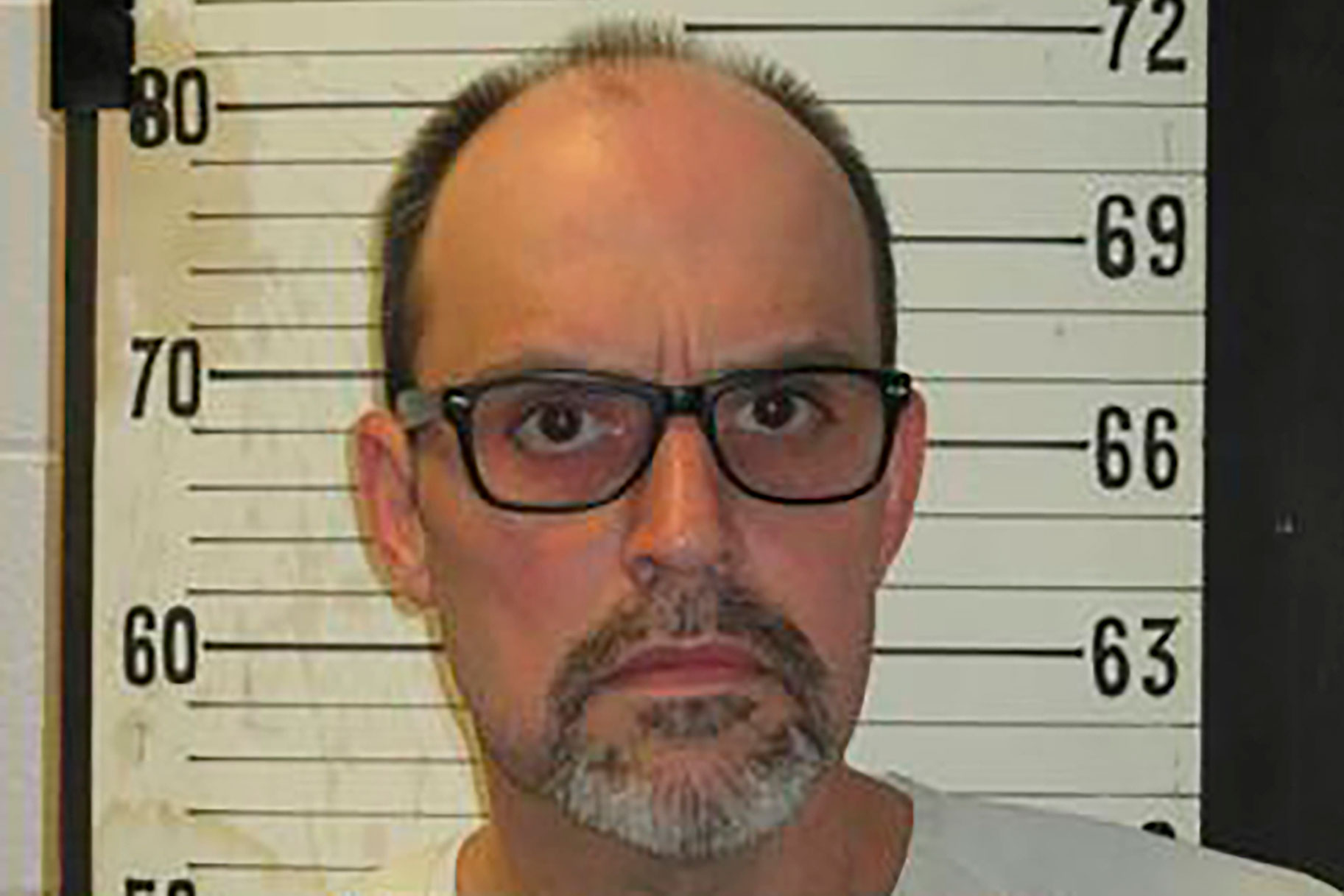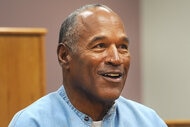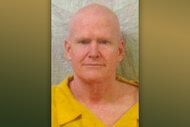Create a free profile to get unlimited access to exclusive videos, breaking news, sweepstakes, and more!
Tennessee Executes Blind Death Row Inmate Who Burned His Ex-Girlfriend Alive
Lee Hall, who torched his ex-girlfriend Traci Crozier’s car using a gasoline bomb and burnt her alive in 1991, dined on a Philly cheesesteak, onion rings, a slice of cheesecake, and a Pepsi for his final meal.

A blind death row inmate was executed in Tennessee on Thursday nearly three decades after murdering his ex-girlfriend with a makeshift gasoline bomb.
Lee Hall was put to death at Riverbend Maximum Security Institution in Nashville on Dec. 5. He was executed using an electric chair and was pronounced dead at 7:26 p.m., according to the Tennessee Department of Correction.
Hall’s lawyers said he’s the second blind death row inmate to be executed since the death penalty was reinstated in 1976. Hall was sentenced to death in 1992 for fatally firebombing his 22-year-old ex-girlfriend Traci Crozier’s car while she was still inside.
Hours earlier, Hall, 53, ate his last meal, officials said. He opted for a Philly cheesesteak, two orders of onion rings, a piece of cheesecake, and a Pepsi.
Witnesses said the execution chamber curtain rose shortly after 7 p.m.
“He was already strapped down when they opened the curtains,” Crozier’s sister, Staci Crozier Wooten, told Oxygen.com.
She watched as correctional officers sponged Hall’s head, ankles, and arms, and affixed an electrode to the top of his head. Wooten said that Hall was nervously “tapping his right hand on the chair, like he was waiting for them to start.”
“When they hit the switch, he flinched,” Wooten described.
At one point, she and other witnesses recalled seeing what appeared to be a wisp of smoke rise from Hall’s face.
“There was like a puff of white smoke coming out of the right side of his head and there was drool coming out of his mouth,” Wooten described.
Wooten, 49, attended the execution with her 74-year-old father, saying she felt “at peace” after watching him die. The execution lasted roughly two minutes, she said.
“I’ve had the best sleep I’ve had in 28 years,” Wooten said on Friday morning, following Hall’s execution. “It was justice for Traci finally.”
Hall had chosen to be electrocuted over lethal injection — Tennessee’s preferred method of execution — under a law that permitted inmates whose crimes were committed earlier than 1999 to have the option of choosing how they die, according to the Death Penalty Information Center, a non-profit that tracks capital punishment trends.
His execution capped a series of dramatic last-minute efforts by his legal team to have his death sentence commuted and his conviction tossed out altogether.
Earlier this year, his lawyers had attempted to have his conviction tossed out after it came to light that a juror who convicted Hall to death in 1992 failed to disclose her past history of domestic and sexual abuse, which the 53-year-old’s defense team said “compromised” the verdict, according to a court petition filed in October and obtained by Oxygen.com.
When a state judge denied Hall’s motion for post-conviction relief, his attorneys petitioned the Tennessee Supreme Court and the state’s governor to delay his execution, both to no avail.
“The justice system has extensively reviewed Lee Hall’s case over the course of almost 30 years, including additional review and rulings by the Tennessee Supreme Court yesterday and today,” the state’s governor, Bill Lee, said in a statement on Wednesday. “The judgment and sentence stand based on these rulings, and I will not intervene in this case.”
Hall’s lawyers said on Friday it was “sad” their client’s execution went forward.
“We’re just really disappointed they went through with the execution given the evidence that was uncovered about the juror,” Stephen Ferrell, one of Hall’s attorneys, told Oxygen.com.
Last year, his lawyers also decried the execution of a Hall, a “functionally blind” man, as a “cruel and unusual punishment” and a “spectacle” that “‘would offend humanity.’”
“Lee Hall is blind and vulnerable,” his legal team wrote in a 2018 court petition obtained by Oxygen.com. “If confined to prison for the remainder of his natural life, Mr. Hall bears no practical risk of harm to anyone.”
Hall had been diagnosed with glaucoma in 2010 and went blind, his lawyers said, after correctional staff failed to adequately treat his condition.
Clarence Ray Allen, who was put to death in 2006 for orchestrating a triple murder while he was behind bars, is the other known instance of the U.S executing a blind person, Hall's legal team previously stated.
During Hall's murder trial in the '90s, prosecutors painted him as a pyromaniac with abandonment and addiction issues, who had possibly been sexually abused. Since childhood, experts said, Hall frequently ignited fires to “express his distress” and had burnt property “four or five times” in 1990 and 1991, according to court documents obtained by Oxygen.com.
A clinical psychologist had also testified, describing Hall and Crozier’s relationship as “volatile.” The day he incinerated Crozier’s car, Hall had supposedly been binge-drinking and had heated altercations with the woman’s family.
“He intended to send a message, that he intended to burn her vehicle,” psychiatrist Dr. Peter Brown testified at Lee’s trial.
He later filled up a tea jug with gasoline, plugged it with paper towel, purchased a cigarette lighter at a gas station, and after getting in an argument with his ex-girlfriend, lit and tossed the Molotov cocktail he had fashioned through the driver’s side window of her car.
Hall later told investigators he hadn’t meant to kill his former partner, who was 22 years old at the time of her death.
“You don’t accidentally pour gasoline on somebody, you don’t accidentally throw a Molotov cocktail at somebody, you don’t accidentally knock their window out to do it,” Crozier’s sister Wooten said. “You don’t accidentally do that.”
A plastic surgeon and burn specialist previously testified that Crozier had been “doused” in gasoline and that her body was scorched so badly that her teeth were charred and she had no hair left. Dr. Sonya Merriman testified that Crozier had burns on “95 percent” of her body, and that it was one of the worst cases of “uniform pattern of burning on an individual” she had seen in treating roughly 100 burn cases.
“She was like a monster from a film,” Wooten said. “This was nothing compared to being zapped and dead. He got it easy.”
Wooten said Hall’s electric chair death, which was over in “a matter of seconds,” was the “easy way out.” She said her sister had to languish in the hospital for 36 hours before she passed.
“That little jolt that went through him and took him out was nothing compared to what my mother, my father, and myself had to witness — her laying there and living for 36 hours, awake, in pain, knowing she was going to die,” Wooten added.














